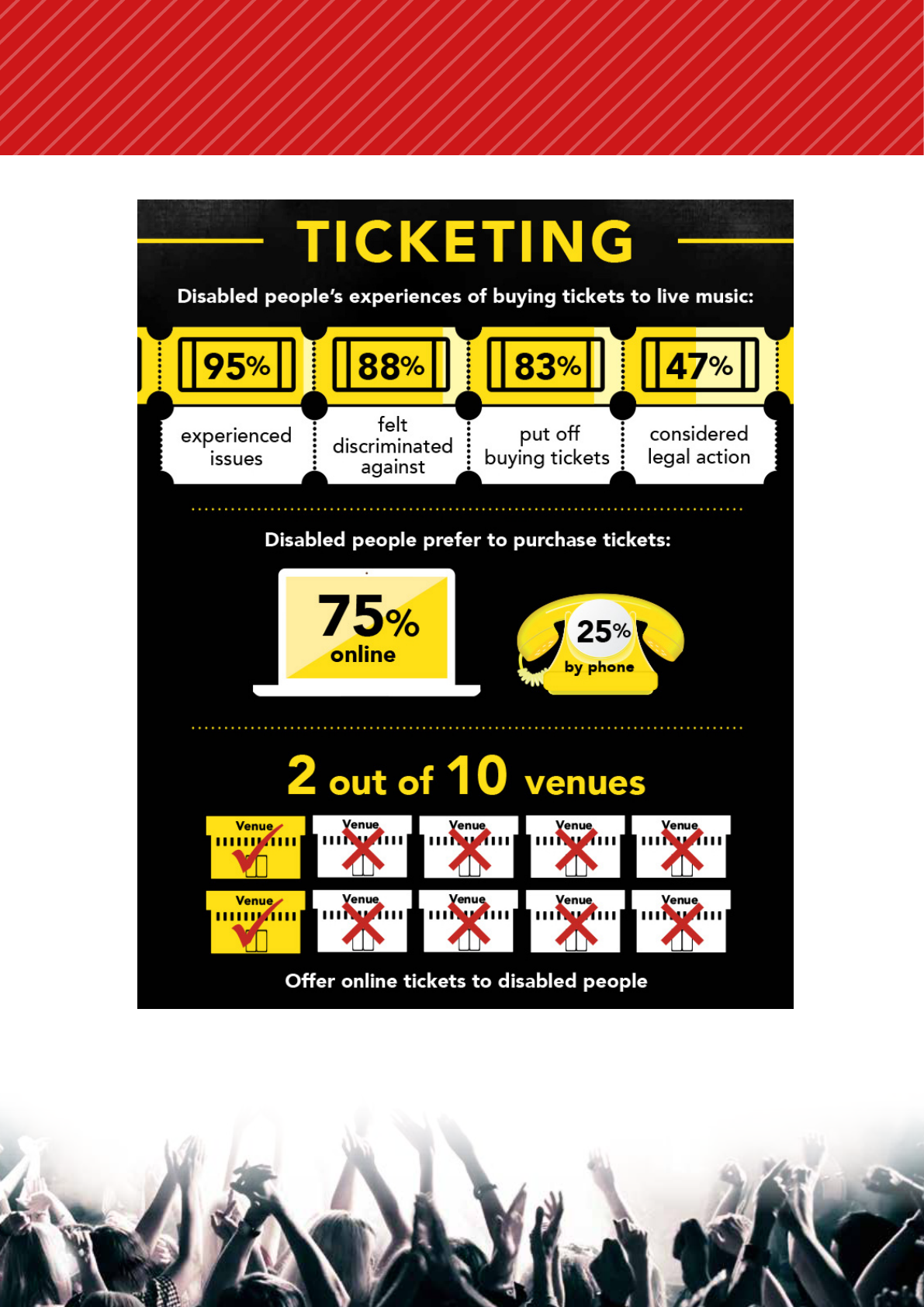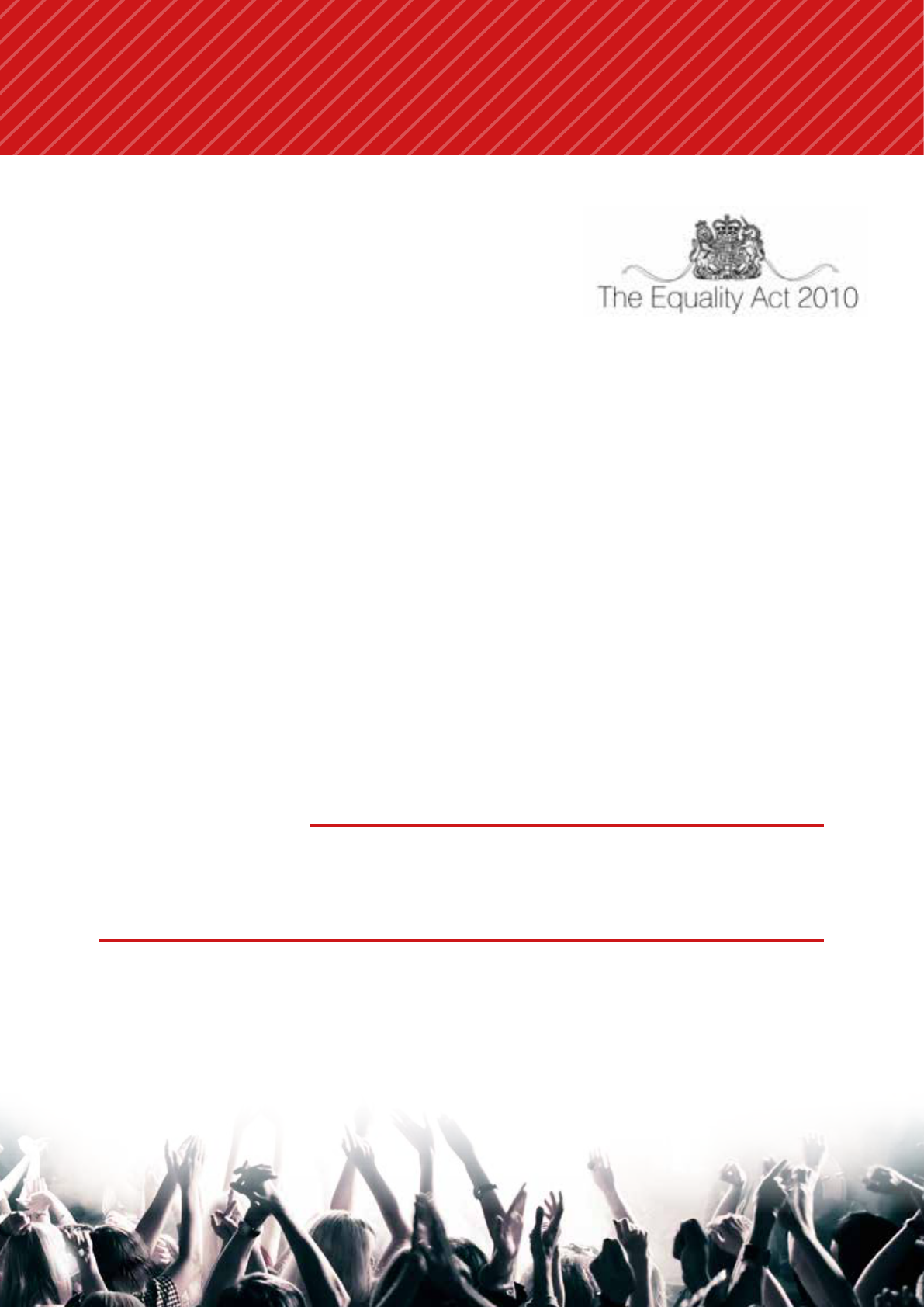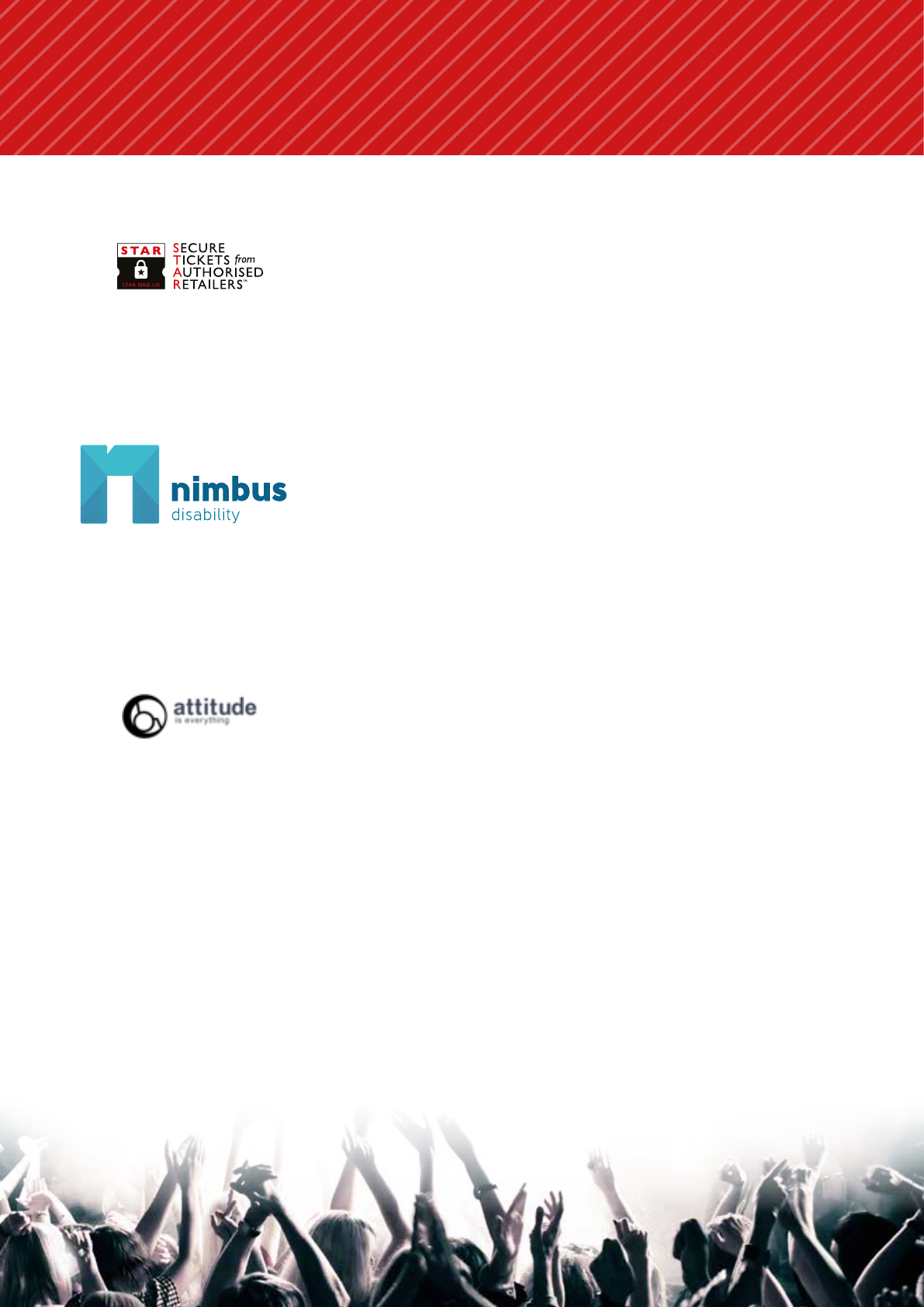
Making Ticket
Sales Accessible
For Disabled
Customers
A Best Practice
Guide

2
About this Guide 3
Foreword by Penny Mordaunt MP 4
Section 1: Context and Principles 5
Background 6
Legal Context 9
What is Less Favourable Treatment? 9
What are Reasonable Adjustments? 10
What is a proportionate means of achieving a legitimate aim? 10
Guidance from the EHRC 11
The Business Case 13
Section 2: Point of Sale Accessibility 14
Selling Tickets in a Box Office environment 15
Physical Accessibility 15
Staff Training 16
Online Sales 17
Why are online sales not readily available? 17
The danger of mis-selling accessible tickets 17
The necessity of preventing fraud 18
The use of phone lines as a reasonable adjustment 19
What adjustments could be made to make online sales available 20
Introducing a registration process 21
Categorising Ticket Types 21
Telephone Sales 22
Choosing the right number 23
Section 3: Essential Companions and Evidencing Disability 24
The role of Essential Companions 25
What / who are Essential Companions? 25
Policy 25
Evidencing Disability 26
Types of Evidence 26
Disability Living Allowance (DLA) / Attendance Allowance (AA) 26
Personal Independence Payments (PIPs) 27
War Disablement Penision / Armed Forces Independence Payement 27
Blue Badges 27
The Access Card 28
Policies 29
Section 4: Further Sources of Support 30
CONTENTS

3
ABOUT THIS GUIDE
Jonathan Brown
Chief Executive, STAR
This guide is intended to highlight both legal
and operational considerations around ticketing
for Deaf and disabled customers. It is the
culmination of a great deal of work that has
followed on from the Attitude is Everything
State of Access Report in 2014.
It’s purpose is simple. There needs to be equal
access to online ticketing and organisations
need to be considering how they do it, not whether they do it. There are many
details to take into account about how this can be achieved and also some
necessary changes of thinking and practice that will be required.
The ticketing industry in the UK is extensive and sometimes complicated and
writing a guide to cover such a broad industry is a challenge. However, the
principles are straightforward and translate to any size of operation, even if the
details of delivery may be necessarily different. We will also look at updating the
guidance in the future, particularly with case studies or to enhance information
about particular issues or sectors. We are open to hearing any suggestions of
content that people would find helpful in a future edition of this guide.
This guide has been commissioned by The Society of Ticket Agents and Retailers
and is sponsored by The Ambassador Theatre Group and JM Marketing, operators
of Securemybooking.com
The guide has been written by Nimbus Disability Consultancy with contributions
from Attitude is Everything.

4
FOREWORD BY PENNY
MORDAUNT MP
Minister of State for Disabled
People, Health and Work
There is no doubting the importance of good accessibility
for disabled people in every part of our society.
And beyond accessibility, we also need to see equality of
experience. We must do all that we can to offer disabled people a real choice in
how and where they spend their time and their money.
This of course extends to supporting people with access needs to attend ticketed
events. The Equality Act makes clear organisations’ responsibilities for the service
they provide to disabled people.
With many large venues and sporting events now using more accessible ticketing,
there can be no excuse for poor practice.
And as a ticket retailer, it would be foolish to miss out on your share of over £249
billion – the “Purple Pound” spending power of disabled people in the UK.
We are seeing more and more innovation in approaches to accessibility, and
the work of Nimbus Disability, Attitude is Everything, and a range of other
organisations in offering solutions to retailers, is key to making things better. I
wholeheartedly welcome the publication of this Guide to support ticketing
retailers in becoming as accessible as possible, and hope that the whole industry
will take the guidance on board. I look forward to hearing about your advances in
accessible ticketing soon!

Section 1
Context and
Principles

6
BACKGROUND
“Even the initial bit about buying a ticket can be complicated. Is there a
PA scheme? Are there special ‘disability access’ tickets or do I buy one
ticket and apply for a PA ticket separately? Can you get access tickets
on pre-sale? All these factors need to be understood beforehand.”
Facilitating ticket sales to the growing demographic that is the Deaf and
disabled cultural audience should be a high priority for any venue, festival or
ticket seller. Rather than comprising of a niche group to be accommodated as
an afterthought, evidence shows that there is significant spending power to be
unlocked when accessibility is addressed, beyond the moral and legal arguments
for equality. DWP stats show that UK households with a disabled person have a
combined income of £249 billion after housing costs.
According to SCOPE, there are 13.3 million disabled people in the UK comprising
of 7 per cent of all children, 18 per cent of all working age adults and 44 per
cent of all pension age adults. We know that more Deaf and disabled people are
seeking to go to cultural events than ever before, but in order to do so, they must
first navigate the ticket buying and access booking process. This is their first
encounter with customer service, and is the gateway that governs whether or not
they end up making purchases and accessing what is on offer.
In our 2014 State of Access Report, a biennial report on access and the live music
industry, we found that 83% of disabled gig-goers surveyed had been put off
buying tickets due to inaccessible booking systems.
The reported barriers included limited booking options, limited availability of both
tickets and reliable access information in advance of the event going on sale, as
well as having to repeatedly prove eligibility for bookable access facilities. 88%
had felt discriminated against during the ticket-buying process, and 47% had
considered legal action as a result.
Suzanne Bull of Attitude is Everything
looks at the experience of customers
to date

7
The report found that whilst 75% of disabled people preferred to book their
tickets online, only 2 out of 10 venues were actually offering online ticketing to
disabled customers, opting instead to sell accessible tickets through in-house
telephone booking lines, often with limited opening hours. We demonstrated that
the UK music industry was losing out on 2.5m tickets sales, or £66m in annual
revenue, by not offering online booking to Deaf and disabled customers.
We concluded that in order for more tickets to be made available for disabled
customers to purchase online, there needed to be more awareness of accessibility
issues and a universal proof of disability system to overcome issues with proving
eligibility.
With this in mind, Attitude is Everything partnered with the Society of Ticket
Agents and Retailers (STAR) to set up a working party involving all of the key
ticketing agencies, including Ticketmaster, See Tickets, TicketWeb, The Ticket
Factory and Eventim, who made a commitment to consider how booking systems
could be made more accessible for disabled people. Since then, the group has
worked to support the development of a universal proof of eligibility card –
the Access Card - and examine how the whole ticket-buying process can be
improved.
Attitude is Everything’s ethos is to positively encourage the music industry and
work with partners to improve accessibility for Deaf and disabled customers. The
voices of Deaf and disabled music fans are at the heart of everything we do, and
they are telling us that they need to see change when it comes to buying tickets
and booking access. We believe that it’s possible to improve current systems in
order to provide a fair and equal service to both
disabled and non-disabled music fans. This guide
is a great step towards this goal. Please join us,
STAR and Nimbus in working to make live music
and the arts accessible for all.
Suzanne Bull MBE
CEO of Attitude is Everything
BACKGROUND

8
Source: Attitude is Everything’s 2014 State of Access Report
www.attitudeiseverything.org.uk/resources/publications/state-of-access-report-2014/
BACKGROUND

9
LEGAL CONTEXT
The Equality Act is a piece of legislation which
gives all organisations certain responsibilities
when it comes to offering their services to the
general public and disabled people.
The main practical focus for businesses needs to be on avoiding treating disabled
customers less favourably than others and being able to identify and implement
‘Reasonable Adjustments’, all the while being conscious of what is practically
possible within the limitations of a business’s internal structures.
What is Less Favourable Treatment?
Under the Equality Act is a unlawful to treat a person less favourably for a reason
relating to disability. This takes into account the customer journey a non-disabled
person might be able to expect in comparison to that which you offer a disabled
person. This might be directly because of the fact a person is disabled or for a
reason relating to or arising from disability.
For example, if all of your customers can book online but a disabled person has to
book in person at the box office this could be seen as less favourable treatment.
It would cost a disabled person more and take a lot longer for them to make a
purchase than others.
TICKETING EXAMPLE
Disabled Customers are required to call a premium rate phone number to book
tickets whereas non-disabled customers can book online for a nominal booking fee.
This could be seen as less favourable treatment.

10
What are Reasonable Adjustments?
Reasonable Adjustments are the changes we need to make to reduce or remove
the chance of a disabled person being treated less favourably.
In the example above we would have a legal responsibility to make an adjustment
to our policy to have disabled people book in person. In the past this has typically
meant offering disabled people a telephone booking service.
Now though we need to ask the question; is a telephone booking line alone less
favourable treatment and can we make further adjustments to that?
What is a “proportionate means of achieving a legitimate aim”?
In some circumstances it might not be possible to offer a service which is directly
comparable with that which we are capable of providing to the general public at
large.
In these circumstances, if it is possible to show objective justification that the
way we provide our services to disabled people is both proportionate and
reasonable then it is possible to have a difference in customer journeys. This can
be especially true where asking for pre-registration or evidence of need for free
companion tickets.
Throughout the rest of this guide these 3 guiding legal principles need to be
borne in mind.
LEGAL CONTEXT
TICKETING EXAMPLE
Making an adjustment to allow disabled people the same booking options as non-
disabled customers.
In this case making accessible tickets available for sale online would be considered
as anticipating the needs of disabled people and exploring the possibility of
making a reasonable adjustment.
TICKETING EXAMPLE
Placing accessible tickets available for online sale without any level of protection
could mean that these tickets are mis-sold. Having a pre-registration process for
customers, whilst not being equal treatment can be seen as being a necessary
process to ensure tickets are only available to those with need for them.

11
Guidance from the EHRC
IIn 2016 The Equality and Human Rights Commission
1
offered an opinion on the current availability of ticket
sales to disabled Customers:
Ticket agents must take reasonable steps to ensure that disabled customers can
access their services. This is set out in the Equality Act 2010 and is called the
reasonable adjustment duty.
“Agents should also ensure disabled people can buy tickets online in the same
way as everyone else.”
The Society of Ticket Agents and Retailers elaborated on
this further;
“Whenever tickets are generally available online, disabled
people should also be able to book by the same method.
“Venues sometimes hold back accessible positions from being sold online as they
want to ensure the customer’s needs are met and believe this is best achieved in
person or on the phone.
“However, despite those good intentions, there is the potential for this to be
considered discriminatory if disabled people are not also able to book online
when that facility is offered to other ticket buyers.
“In addition, tickets for events are often allocated to different ticket agents and
accessible positions do not usually form part of that allocation. However, as
customers with access needs cannot be served, a reasonable adjustment needs
to be made.
Ticket agents should therefore provide information about where disabled people
can buy tickets for an event.”
1. “Equality and Human Rights Commission - GOV.UK”
https://www.gov.uk/government/organisations/equality-and-human-rights-commission
LEGAL CONTEXT

12
Code of practice and guidance
The Equality and Human Rights Commission have published a code of practice
and guidance on the reasonable adjustment duty. Please follow the links below
for more detailed information about members’ legal obligations.
• www.equalityhumanrights.com/en/publication-download/services-public-
functions-and-associations-statutory-Code-practice
• www.equalityhumanrights.com/en/advice-and-guidance/equality-law-
theatres-and-other-entertainment-venues
• www.equalityhumanrights.com/en/multipage-guide/delivering-services-and-
law
LEGAL CONTEXT

13
THE BUSINESS CASE

Section 2
Point of Sale
Accessibility

15
SELLING TICKETS IN A BOX OFFICE
ENVIRONMENT
If the option for Box Office sales exists for non-disabled customers then due
consideration must be given to this environment for disabled customers.
Physical Accessibility
There is guidance available for the recommended layout and dimensions of
reception counters
2
and in all cases priority must be given to making a Box Office
as physically accessible as possible.
Accessibility extends beyond lowered counters and consideration must be given
to the installation of auxiliary aids such as loop systems.
For some small venues, however, making a small Box Office accessible would
be impossible and therefore further consideration should be given to making
adjustments which remove the need for physical access.
Ideally, consideration should be given to having an Access Audit undertaken by
a suitable organisation. This would result in the production of a prioritised list of
recommendations for alterations to the box office environment and beyond.
2. This can be found in Approved Document M of the Building Regulations and
guidance contained in the relevant British Standards.

16
Staff Training
In order to meet the needs of disabled people, it is is critical that front line and
senior staff are appropriately trained and equipped to meet the needs of disabled
customers.
A big barrier faced by disabled customers is speaking to staff who are not aware
of what an organisation’s policies or procedures around booking accessible
seating is.
Training should look at internal systems such as policy, but should also be
extended to cover more generalised topics such as Disability Equality and
Awareness, The Law as it applies to service providers, General Etiquette and
Terminology.
This type of training should be delivered by a suitably qualified and experienced
trainer with lived experience of disability.
SELLING TICKETS IN A BOX OFFICE
ENVIRONMENT

17
ONLINE SALES
The starting point for looking at whether we are offering the same customer
journey for disabled people is to look at the accessibility of the journey most
people use.
Most major ticket sellers for entertainment events now see well over 90% of their
transactions taking place online and, as such, there needs to be a focus on giving
disabled customers the same opportunity of choice.
Why are online ticket sales not readily available?
Historically, online ticket sales to disabled people have been rare and problematic,
given the differences between a ticket retailer and a venue operator.
There is a reluctance to place accessible tickets on open sale for a number of risk
factors; primarily being the protection of the seats from fraudulent or accidental
purchase.
The danger of mis-selling accessible tickets
For extremely busy on-sales, where any available ticket can be sold without any
scrutiny on the part of the purchaser, it is important that a line of defence is in
place to ensure that accessible tickets are only sold to disabled people.
Without that layer of protection, it would be very easy for someone to purchase
tickets accidentally. Or perhaps in a situation where a desperate customer looking
for tickets for an an otherwise sold out show might buy them and then worry
about the consequences and logistics later.
TICKETING EXAMPLE
Adele announces a new UK Arena tour - when tickets go on sale, panicked fans just
click on any available ticket type and worry about the consequences later.
Whilst this type of behaviour isn’t deliberately fraudulent, it does mean that fans
genuinely in need of the accessible spaces will have less chance of successfully
making a purchase.

18
The necessity of preventing fraud
It is clear that any system which allows for the purchase of 1 ticket plus 1 free
ticket will be the target of fraud. As such, not only has it been difficult to put
these tickets on open sale, it has also become necessary (for some providers
in some situations) to ask for a proportionate level of evidence to support the
genuine need for a free ticket.
It is also true that some of the additional facilities put in place to support disabled
people can be seen as more favourable treatment; better sightlines, easier access,
smaller queues for the toilets and so on.
3.Taken from a Sun Article.
4. NB - this is the Sun’s terminology and we would urge the use of
‘wheelchair user’ over ‘wheelchair-bound’
ONLINE SALES
TICKETING EXAMPLE
3
“A SUPERFIT football supporter pretended to be wheelchair-bound
4
to get a front-
row spot for Liverpool’s sell-out clash with Everton.
Kop fan Jake Danna, 23, who does triathlons, had got hold of a disabled ticket”

19
The use of phone lines as a reasonable adjustment
It has become commonplace to remove all accessible tickets from online sale
and make them available to disabled customers via a manual process operated
directly by the venue or promoter, often through ‘disabled booking lines’.
In the past this would have been what would be seen as a proportionate means of
achieving a legitimate aim; protecting tickets to ensure that a disabled customer
could get the right access was only achievable by directly contacting the
individual member of staff with responsibility.
Any frustration on the part of the customer for not being able to book online was
an extremely unfortunate, yet necessary, by-product of the only reasonable policy
it was possible to implement.
Now, however, as technological capacity and popularity increases, it is vital that
all providers consider what adjustments can be made to facilitate online sales for
disabled people.
As mentioned in the beginning of this guide by Attitude is Everything; STAR
has taken up the challenge set by Attitude is Everything to ensure that a more
equitable, streamlined and consistent customer journey is available for disabled
customers wanting to access live music and entertainment events.
ONLINE SALES
TICKETING EXAMPLE
Disabled customers must call a specialist booking line to call as the venue has
decided to not make online sales available. This option protects tickets for those
customers that need them, but is not equal treatment and is not the preferred
booking method of many disabled customers.
Consideration must be given to making online sales available.

20
What adjustments could be made to make online sales available
When deciding what adjustments can be made to a part of your service provision
it is important to identify the barriers that need to be overcome and find solutions
for each in turn.
Considering the issues and barriers earlier in this report, it can be useful to create
a table which explores such barriers in relation to your own offer.
Barrier Adjustment
Need to pre authorise certain ticket
types to be sold to a particular
customer
Instigate a pre-registration scheme
Ticketing system is not set up to pre
authorise ticket sales type
Amend / replace current ticketing
system
Staff base does not have knowledge /
capacity to run a registration scheme
Train staff and increase resources
Running a registration scheme
could be seen as an extra layer for
disabled customers and therefore less
favourable treatment
Argue that this is objective justification
or link with another pre-registration
scheme which meets both your and
your customers needs such as the
Access Card or Hynt schemes.
The current ticketing provider is unable
to handle online sales
Allocate accessible ticketing allocation
to a provider that can process these
sales and make it clear at all points
of sale that disabled customers need
to make their purchase through this
provider
ONLINE SALES

21
ONLINE SALES
Introducing a registration process
Capturing information about a disabled customer’s needs for access is the key
element of a registration system.
It is an opportunity to pre-authorise particular access benefits which then
correspond to online booking features or ticket types..
It is also an opportunity to seek additional information which supports the
legitimate need of such facilities. (see later the section on Evidencing Disability)
Categorising Ticket Types
In making ticket sales available to disabled customers it is important that you
are able to categorise and protect certain types of seating to be unlocked and
purchasable only by customers who have been whitelisted through the use of
either; an internal pre-registration process or, the integration of a third party
process such as the CredAbility Access Card.
The choice of seating can then be made by the customer. The distinction
between the type of seating should be made clear to ensure the right type of
seating is chosen by the customer.
Wheelchair Accessible Bays
• Wheelchair Accessible bays should typically account for 1% of overall
capacity. These should be made available to wheelchair users who remain
seated in their chair for the duration of the event
Ambulant Seating
• Ambulant, or easy access seating, is typically standard seating which is
accessed by short distances and avoids stairs. This again should account for
1% of overall capacity and should have a proportion protected for people
who would not be able to attend unless seated in this kind of area

22
Seats within Loop Range
• Customers with a hearing impairment may require the use of loop systems
which will only have an effective working range in specific parts of your
venue. The seats that are able to access this should be clearly categorised
and protected for the use of those that require them
Shortened line of sight
Nearby Toilet Access
• For some customers urgent access to a toilet may be the difference between
booking a ticket and not. Where possible seating with the easiest access to
WC’s should be highlighted to customers acknowledging this need
Essential Companions
• Free ticket allocations should be made available for Essential Companions
with a paid ticket. These should not be restricted to being sold in any specific
areas of the venue as, with the support of a companion, disabled customers
may be willing and able - perhaps even prefer to - sit in other areas of the
venue, for example with a group of friends.
ONLINE SALES

23
TELEPHONE SALES
“Disabled people trying to buy gig tickets sometimes have to “wait hours” on
“premium rate telephone lines” and are often seated separately from family and
friends, a study has suggested.
“Some have even missed out on concert or festival tickets because venues have
delayed accepting proof of disability
5
.”
Whilst the previous section looked at the requirement to make Reasonable
Adjustments to ensure Online Sales can be a possibility for disabled customers, it
is important to remember that for some disabled customers, online sales may be
completely inaccessible and others may simply prefer to ensure they can discuss
their needs with the venue directly.
In these circumstances it is vital to ensure that a proportionate level of customer
service is available via telephone.
Choosing the right number
One thing that needs to made explicitly clear is that at no point should a disabled
person be forced to bear the cost of any type of adjustment.
As such, choosing an access line which does not incur charges in excess of the
cheapest alternative booking method is a must. If you are offering this service
on a premium rate phone line there is a very good chance to you are directly
contravening the Equality Act.
5. Taken from a 2013 BBC News Article

Section 3
Essential
Companions
and Evidencing
Disability

25
THE ROLE OF ESSENTIAL
COMPANIONS
It is now seen as common practice to offer disabled people a free ticket for a
carer / Personal Assistant / Essential Companion, however, this causes additional
complications in the booking process and there is generally an air of confusion
around: what they are, who they’re for and how to make sure they only go to the
right people.
What / who are Essential Companions?
The terminology differs between different events and sectors and in this guide we
will be using the phrase Essential Companions. It is felt that this is the term which
most accurately describes both the role and to some extent the eligibility.
An Essential Companion is seen as someone who provides a customer with a
level of support that, without which, they would be unable to safely enjoy your
services on the same level as non-disabled customers.
It is generally seen as a Reasonable Adjustment to pass some of the responsibility
of providing support to a disabled customer to a person that knows them in
exchange for a free ticket of entry to a show / event.
It is not a buy-one-get-one-free scheme and it is important that Essential
Companions are made aware of the level of responsibility they are accepting in
exchange for a free ticket.
Policy
It is important that any venue operating an Essential Companion scheme has a
clearly defined and proportionate policy which may or may not include the need
to ask for evidence of need. It is accepted that some venues and shows are more
likely to be subject to customers misrepresenting their needs than others.

26
EVIDENCING DISABILITY
6
As accessibility at live music events improves, policies and facilities specifically for
Deaf and disabled music fans are becoming more commonplace.
In some cases music venues and festivals may feel that there is a necessity to
ask for evidence of disability, where it is felt that not doing so encourages or
enables fraudulent or unnecessary access to reasonable adjustments, such as free
Personal Assistant tickets.
Anecdotal evidence from providers suggests that having a system of evidencing
in place reduces fraudulent access and increases the actual capacity for disabled
customers.
It is a potentially sensitive subject which should be handled delicately, allowing
your customers to retain as much privacy and dignity as possible, and should be
done proportionally to the service being offered. For example, asking for detailed
medical reports from a wheelchair user booking in person at a box office would
be seen as disproportionate.
There are a number of things you are able to ask for from disabled people which
most (but not necessarily all) will have readily available. Each has its own pros
and cons:
Types of Evidence
Disability Living Allowance (DLA) / Attendance Allowance (AA)
Asking for a copy of DLA entitlement is the most common form of evidence
requested and produced. It is a good guide that a person meets the definition
of disabled as laid out in the Equality Act but it doesn’t readily translate into the
types of support a person might need.
It is split into two components - care and mobility, of which a customer can
be entitled to either or both at different levels. It would not be unreasonable
to expect that an individual in receipt of any level of the care or the mobility
component would require support from another person.
6. Taken from ‘Evidencing Disability’ A Practical guide co-written by Nimbus Disability and Attitude is Everything

27
Personal Independence Payments (PIPs)
A major drawback to DLA and AA is their eventual replacement by PIPs in the
coming years. Awards at the enhanced rate of either component would most
likely indicate the need for an Essential Companion, but could equally be required
for recipients of the standard rates in a live music setting.
War Disablement Pension / Armed Forces Independence Payment
This is a payment made to those who were injured or got an illness while serving
in the armed forces (including the reserve forces). Again there may be no direct
translation of need but each can be a good indication of an underlying medical
diagnosis which impacts a person’s independence
Blue Badges
Blue Badges are simply an entitlement to park in designated parking bays and
are awarded to people for a wide variety of impairments and needs and the
entitlement can be interpreted differently between local authorities.
Other potential indicators of need
There are all kinds of other pieces of information people might be able and
willing to produce in support of their access requirements. Deaf People may
have prescriptions for hearing aid battery replacements; People with visual
impairments may have registration cards from their local authorities or assistance
dog ID.
There are two industry specific card schemes in operation for theatres in Wales
and Cinemas throughout the UK: The Hynt Card and The CEA Card
There are a whole range of discount travel cards, loyalty cards and so on which
are based on the presentation of a DLA award letter, but, each reports less about
the users need beyond the actual purpose of the individual card.
We would not suggest that you explicitly ask for a doctor’s letter for eligibility, as
this can involve an additional cost to the disabled person.
The Access Card scheme, run by Nimbus Disability, is seen as the preferred option
by STAR, venues and ticketing companies.
EVIDENCING DISABILITY

28
The Access Card
The Access Card has been developed by
Nimbus as a consistent and reliable way of
both evidencing disability and reporting the
specific needs of disabled people. It’s an optional
choice which disabled people sign up for and is
accepted at venues and festivals across the UK,
including Download, Glastonbury and all of AMG’s
Academy venues.
There is also the option for the provider to gain access to online verification
in order to complete bookings over the phone and API integration into native
ticketing software is now readily available.
The Access Card allows both the customer and the provider to place the
emphasis on improved customer service over the need for evidencing.
EVIDENCING DISABILITY
Expiry Date
18/10/2025
<
50m
WC
+
1

29
Policies
The real key to approaching this subject is how you word your policies; this
should be contained within the main body of your access statement and
information. We’d recommend that you detail what proof (if any) you will accept
for automatic eligibility, as well as adding a statement suggesting that you will
review an application without the recommended evidence on a case-by-case
basis.
The focus should be given to explaining why you are asking for information and
that you stress that it is for the benefit of disabled customers in the long run.
Clear concise information should be given about the types of evidence you will
consider for each element of access you are looking to provide. For example a
Blue Badge would entitle a disabled customer to use accessible parking spaces
but not be adequate for a free Personal Assistant / Essential Companion ticket.
Aside from the Access Card, most proof documents don’t translate directly to the
reasonable adjustments that are required, so in the absence of an Access Card it
is worth considering that a narrative of the individual’s needs is collected at the
same time in the form of a short registration form.
Once this information has been provided, we would recommend that this be
securely summarised and added to an Access Address book which would remove
the requirement for customers to repeat themselves at each booking.
EVIDENCING DISABILITY

Section 4
Further sources
of Support

31
STAR
The Society of Ticket Agents and Retailers - was formed in 1997 and is
the leading self-regulatory body for the entertainment ticketing industry
across the United Kingdom, with many of the biggest names in ticketing
as members.
www.star.org.uk
01904 234737
info@star.org.uk
Nimbus Disability / The Access Card
Nimbus Disability is a specialist consultancy supporting businesses
with identifying and implementing reasonable adjustments and also
promoting them. Nimbus Disability are the authors of this report and the
creator and operator of the Access Card Scheme. Nimbus offers a range
of training, auditing and additional services.
www.nimbusdisability.com
www.accesscard.org.uk
01332 404023
info@nimbusdisability.com
Attitude is Everything
Attitude is Everything improves Deaf and disabled people’s access to
live music by working in partnership with audiences, artists and the
music industry. Over 120 venues and festivals have signed up to the
charity’s Charter of Best Practice. Attitude is Everything also provides
access consultancy for music venues and outdoor events, and bespoke
Disability Equality Training for the live events industry.
www.attitudeiseverything.org.uk
020 7383 7979
info@attitudeiseverything.org.uk
The National Register of Access Consultants
The National Register of Access Consultants (NRAC) is an independent
UK wide accreditation service for individuals who provide access
consultancy and access auditor services. It was set up with government
backing to provide a single source for organisations seeking competent
advice in relation to inclusive environments and accessibility.
